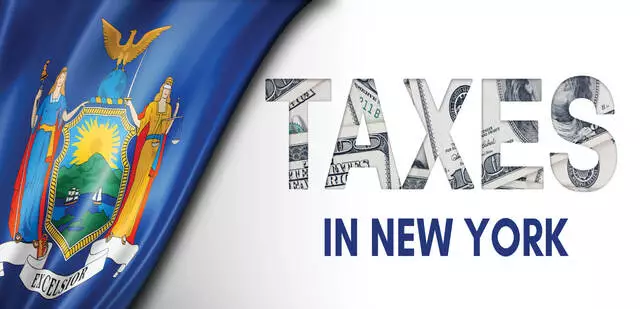
My Thanksgiving dinner is mostly-digested and the snow on my lawn has mostly-melted. It is back to my regularly-scheduled programming, and this week my visit to the Division of Tax Appeals' website disclosed that the Tribunal posted two decisions and the ALJs issued three orders.
ALJ Orders
Matter of Zelinsky, Supervising ALJ Friedman, November 17, 2022; Div’s Rep. Michele W. Milavec, Esq.; Pet’s Rep. Edward A. Zelinsky, Esq.; Article 22. Judge Friedman granted Petitioners’ motion to consolidate their ALJ petitions for 2019 and 2020. The Supervising ALJ found that inasmuch as the Division did not object to the motion, and judicial economy would be advanced by having a single hearing on both matters since the factual and legal issues in both years were similar, it was proper to consolidate the petitions.
Ho hum.
And the legal issue being challenged in the petitions? Just a little something we like to refer to as the “convenience of the employer” doctrine! That doctrine, which has a shaky reputation, allows the Division to treat as New York source income the compensation an employee earns from working outside of New York for their own convenience if the compensation is paid while the employer is assigned to a New York work place. So, for instance, the doctrine requires that compensation paid to a law professor at Benjamin Cardoza Law School (located in New York City) is sourced to New York even if a lot of the work done by the Professor is performed in the Professor’s home office in New Haven, Connecticut.
This is the second time Prof. Zelinsky has tilted at this particular windmill. In 2004, the US Supreme Court denied certiorari the first time around. I wonder if Professor Zelinsky thinks he’ll have more traction with the Court after New Hampshire v. Massachusetts (mot. for lv. den. Sup Ct. June 28, 2021) recently attempted to get a similar issue before the Court.
Lace up your shoes, buckle your seat belts, and grab your popcorn, boys and girls. This is going to be a long ride. I imagine that Mr. and Ms. Zelinsky are going to lose at ALJ, TAT, the Third Department and then the Court of Appeals before finally getting to the front door of the Supreme Court with their issue. Will they be let in this time? STAY TUNED!
Matter of Sakow, Judge Maloney, November 17, 2022; Div’s Rep. Jennifer L. Hink-Brennan, Esq.; Pet’s Rep. Carol M. Luttati, Esq.; Article 22. In a rare win for taxpayers, Judge Maloney granted most of Petitioner’s demand for a bill of particulars. In this case, the Division asserted a liability against Petitioner and her husband for the 2015 tax year. Petitioner’s husband died in 2017. Petitioner challenged both the substance of the Notice and filed a claim that she was an innocent spouse. BCMS orders denying the substance claim and her claim for innocent spouse relief were issued simultaneously and Petitioner filed a timely DTA petition. Following the Division’s Answer, Petitioner filed a Demand for a Bill of Particulars seeking additional information with respect to the Division’s case: four areas of additional information sought involved clarification on the Division’s denial of innocent spouse relief and two areas of additional information sought involved clarification regarding the Division’s assertion of penalties.
Once a taxpayer establishes initial entitlement to innocent spouse relief, the burden of proof shifts to the Division to show that the taxpayer was involved in a fraudulent scheme, had actual knowledge of the under-reporting at the time the return was filed, or had property transferred to the taxpayer to avoid payment of tax. Since the Division bore the burden of proof on those issues, Judge Maloney sustained the Demand for the Bill of Particulars to the extent of the four requests relevant to the innocent spouse issue. But since Petitioner bore the burden of proof on the penalty issue, Judge Maloney denied the Demand to the extent of the two requests seeking clarification of the penalty issue.
Matter of 180 Candy Grocery Tobacco Corp., Judge Maloney, November 17, 2022; Div’s Rep. Bruce D. Lennard, Esq.; Pet’s Rep. Fadhil Karinah (owner); Articles 20, 28 and 29. Petitioner was issued a Notice of Determination on July 22, 2021, asserting a $20,000 penalty (the “Penalty Notice”). Petitioner was issued a Notice of Proposed Revocation of Sales Tax Certificate of Authority on August 20, 2021 (the “Revocation Notice”). Petitioner timely challenged the Revocation Notice through the filing of a BCMS request. The BCMS request was denied in an Order dated November 12, 2021. Petitioner filed an ALJ petition on December 27, 2021 challenging both the Penalty Notice and the Revocation Notice.
Judge Maloney granted the Division’s motion to dismiss (or for summary determination) with respect to the challenge to the Penalty Notice finding that the Division had proven the mailing of the Penalty Notice and that Petitioner did not file a BCMS request or an ALJ petition within 90 days of the issuance of the Penalty Notice.
Since the Division did not prove when the BCMS Order was issued, the Division’s Motion to Dismiss with respect to the BCMS Order sustaining the Revocation Notice was denied. However, one expects the Division will raise the issue again at the hearing. The statutory time limits for challenging Revocation Notices, or BCMS Orders sustaining Revocation Notices, is only 30 days and not the normal 90-day period provided for most other notices. If the Division can prove that the BCMS Order was mailed on November 12, 2021, it seems likely that the December 27, 2021, petition will be found to have been submitted a couple of weeks too late.
Tribunal Decisions
Matter of Gorski, November 17, 2022; Div’s Rep. Colleen McMahon, Esq.; Pet’s Rep. pro se; Article 22. Petitioners were, apparently, entitled to treat certain of the capital gains as subject to a 0% rate for federal income tax purposes. Petitioners construed the untaxed gains as being excluded from federal adjusted gross income when calculating New York AGI. The Tribunal agreed with the ALJ that, even though the gains were not federally-taxed since they were subject to a 0% rate, the gains were nonetheless included in Petitioners’ federal AGI. Since there is no explicit subtraction modification for these types of gains, the Tribunal also concluded that the gains should have been included in Petitioners’ New York AGI and subject to tax in New York.
Matter of Richardson, November 17, 2022; Div’s Rep. Michele Milavec, Esq.; Pet’s Rep. pro se; Article 22. A timy…sort of. The Tribunal agreed with the Supervising ALJ that Petitioner’s petition was legally inadequate to create jurisdiction for the Division of Tax Appeals. The Petition was not signed, did not provide a copy or the number of the Notice being challenged, and those deficits were not corrected even after Petitioner had been requested to do so. However, the Exception corrected those deficits so the Division had, at least at the time it filed its brief on exception, practical notice of the issues in dispute. The Tribunal decided that it wouldn’t be proper to allow petitioners to cure facial defects in a petition as part of a post-dismissal Exception by providing the missing information in the Exception. The Tribunal felt that allowing a petitioner to cure defects post-dismissal would lead to a lack of finality and might hamper its obligation to provide a fair forum for addressing New York tax disputes. And, as the Tribunal pointed-out, Petitioner may always pay the tax and file for a refund.

